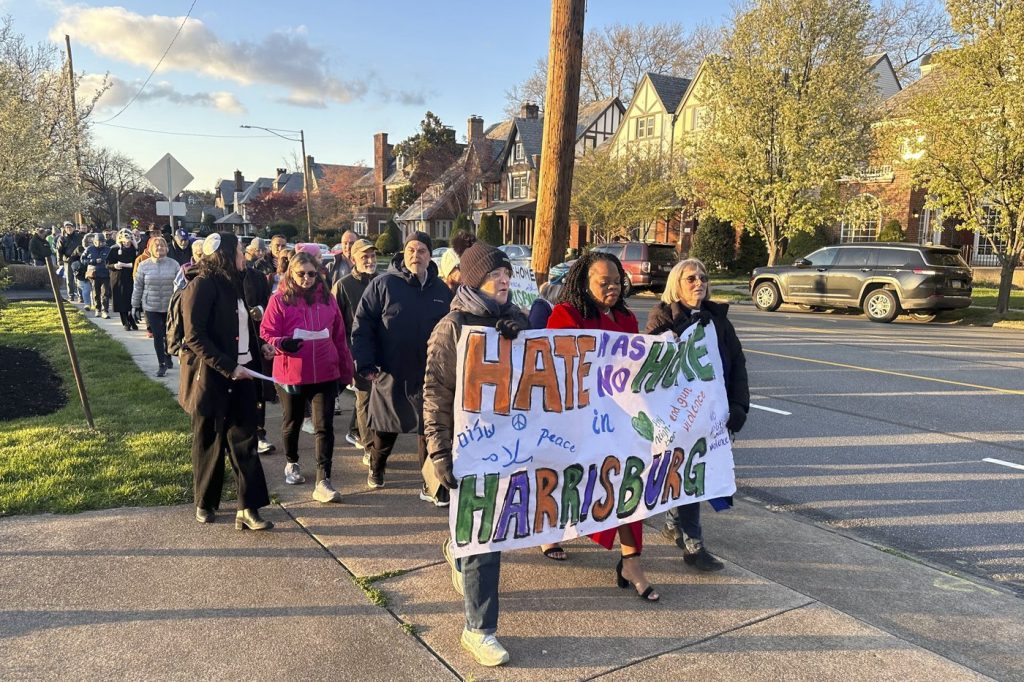HARRISBURG, Pa. (AP) – Carole Zawatsky, invited to a Passover Seder hosted by Pennsylvania Governor Josh Shapiro, reflects on the destructive aftermath of an arson attack on the governor’s official residence. This incident occurred mere hours after Shapiro celebrated the Jewish holiday in the very same room that was later damaged by a firebombing.
As Zawatsky peruses photos of the devastation, she can't help but contemplate her previous seat and the potential lethality of the attack. The Jewish community in Pennsylvania, already familiar with such tragedies, feels particularly targeted by this act against the state's religiously observant governor.
Zawatsky leads a Pittsburgh organization dedicated to combating antisemitism and honoring the victims of the 2018 Tree of Life synagogue shooting. This mass shooting resulted in the deaths of 11 worshippers, marking the deadliest attack against Jews in U.S. history. “Seeing those images is deeply traumatic,” stated Zawatsky, who is the CEO of The Tree of Life organization established following the tragedy. She emphasized the universal right to celebrate faith without fear.
The investigation into the recent incident presents a more complicated picture regarding the assailant's motives. Cody Balmer, 38, has been apprehended for the arson attack. He reportedly confessed to being driven by hatred towards Governor Shapiro, specifically targeting him for his political stance on Palestine. However, details surrounding the motivations remain murky, with family members asserting that Balmer has struggled with mental illness.
Pennsylvania State Police quoted Balmer as saying, “Governor Josh SHAPIRO needs to know that he ‘...will not take part in his plans for what he wants to do to the Palestinian people.’” This statement raises questions about the attack’s intentions, and Senate Democratic Leader Chuck Schumer has urged federal investigations to determine if the assault can be classified as a hate crime.
Survivor of the previous synagogue shooting, Audrey Glickman, expressed admiration for Shapiro’s composed response after the latest attack and his condemnation of hatred irrespective of the motives. Glickman noted the importance of addressing the emotional impact of such attacks on communities.
Shapiro, who had previously addressed the trauma following the 2018 attack and its ongoing implications, continues to emphasize the need for unity. As he leads initiatives to counter antisemitism, the current arson incident has prompted discussions among community leaders about the increasing security measures necessary for Jewish institutions. Attendees at a vigil in Harrisburg noted the connection between the attack and a rising political climate marked by hostility.
The phenomenon of escalating antisemitism has been echoed by Pennsylvania Jewish Coalition director Hank Butler. Balmer’s mental state is also under scrutiny, with claims from family indicating severe struggles. His brother noted Balmer’s irrational beliefs and anger towards family who disagreed with his views. The public defender for Balmer highlighted the potential impact of untreated mental illness on the events that unfolded.
Shapiro has faced scrutiny regarding his identity amid political discussions, especially as criticism from Republican entities emerged following the Democratic primary for the vice-presidential nomination. Rabbi Rick Jacobs addressed the compounded risks faced by leaders who advocate for causes, raising questions about vulnerability for public figures connected to Israel.
In this climate, Zawatsky reflected on the lasting trauma associated with antisemitism, stating, “It’s very sad to think we pass down the inherited trauma of the fear of antisemitism.” The community continues to grapple with the shifting dynamics of safety, identity, and the shared experience of fear among minorities, reinforced by recent events.










